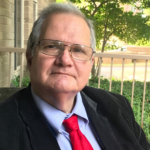
Thanksgiving is, in many ways, the quintessential American holiday. Its origins—an English non-conformist Protestant sect’s celebration with pagan Indians—hardly seems the stuff of Catholicism. Is the author then going to try to wedge a Catholic angle into Thanksgiving?
No. I’m going to argue that Thanksgiving is the quintessential Catholic celebration.
Why? Because we do it every day (except for Good Friday), when we celebrate the Eucharist. Eucharistia (εὐχαριστία) literally means “thanksgiving.” (No trademark infringement proceedings against Pilgrims anticipated.)
Whenever Catholics celebrate the Eucharist, they celebrate “thanksgiving”—thanksgiving that, in his sacrifice on the cross made present again here on the altar, Jesus Christ rescued us from death and gave us the opportunity for life everlasting. He restored to us what Adam had lost for us. Now the only reason to be lost is that you want to be.
That’s a lot to be thankful for.
And, I’d add, something to be constantly thankful for. It’s a paradox that the Pilgrims and certainly the Puritans—but to a large extent, most Protestants—actually marginalized the Eucharist. Yes, Catholics ideally have celebrated the Eucharist every day. But let’s make one thing perfectly clear: the Eucharist was the focus of what Christians gathering in churches every week for centuries celebrated. Up until the sixteenth century, the celebration of the Eucharist was the Sunday liturgy. It was what Christians East and West gathered for on the Lord’s Day.
It is only after the Protestant Revolution that the Eucharist was displaced by Bible reading and preaching services. That’s not to say that Protestants “recovered” the Bible, because they didn’t: the Christian Sunday liturgy was always composed of “the Liturgy of the Word” and “the Liturgy of the Eucharist.” In the ancient Church, the Liturgy of the Word came first, because catechumens (those preparing for baptism) gathered with Christians to hear it. But they were then dismissed. Only those “initiated in the mysteries”—i.e., baptized and not serious sinners—took part in the Liturgy of the Eucharist. What John Calvin et al. did was amputate the central act of the Church’s weekly liturgy—her liturgy of “thanksgiving”—reducing it to a monthly or quarterly occasional “service.”
Besides being historically ungrounded, the marginalization of the Eucharist arguably undermined what Karol Wojtyła (the future St. John Paul II) called the Christian “attitude of thanksgiving.”
In his pre-papal book, Sources of Renewal, Wojtyła speaks of “consciousness” and “attitudes.” “Consciousness” is an awareness of certain realities (like “creation”) seen explicitly through the Christian lens. “Creation” is a “consciousness,” an awareness of all that we have that didn’t have to be, even if it is; that it did not come about randomly or accidentally, but by the design of a loving intellect and will (however that intellect and will arranged for it to happen); and that it is good. We can see how that “consciousness of creation” is at odds with secular presumptions of random chance, lack of design, and lack of intrinsic value. The man who is conscious of creation has already made an incipient act of faith.
“Attitudes” then define how we look at what we are conscious of. If we regard creation as gift, good, and intended, our attitude should be one of thanksgiving. As everything that exists is created and depends on God—not just for a one-time creation from which he is now on permanent leave (deism), but rather his constant sustaining presence (since contingent being is not self-sufficient)—man can never evade creation. And since he can never evade something that did not have to be, but is, and is good, how can his attitude be anything but a constant act of thanksgiving?
We should not be surprised, therefore, that the Church’s tradition from its earliest days (e.g., Acts 20) was to celebrate the Eucharist (i.e., “break bread”) on “the first day of the week.” (Please spare the tendentious attempts to claim that this was just a farewell supper for Paul.) Neither should we be surprised that, in her best spiritual tradition, the Church sought to celebrate Eucharist as often as she could, even daily. She could not avoid sacramental thanksgiving when thanksgiving is the essential attitude of Christians—not just for the creation that constantly surrounds them, but in consciousness of redemption from sin and death through Jesus’ death and resurrection, a reality made present in the Eucharist.
Familiarity sometimes breeds forgetfulness, and so perhaps we sometime forget thanksgiving for creation and redemption. But circumstances also sometimes make human beings particularly aware of what they have to be thankful for. Those Pilgrims still alive in the fall of 1621—roughly half—had reasons to be thankful. They had not succumbed to disease. They had not landed among hostile Native Americans. They managed to produce an initial harvest. The darkest months seemed arguably behind them. They had reason to be thankful and, in that act, also bequeathed to a nation they would know nothing of a tradition it still keeps four centuries later.
But the Christian origins of thanksgiving go back not to a harvest festival. They go back to a Last Supper.



